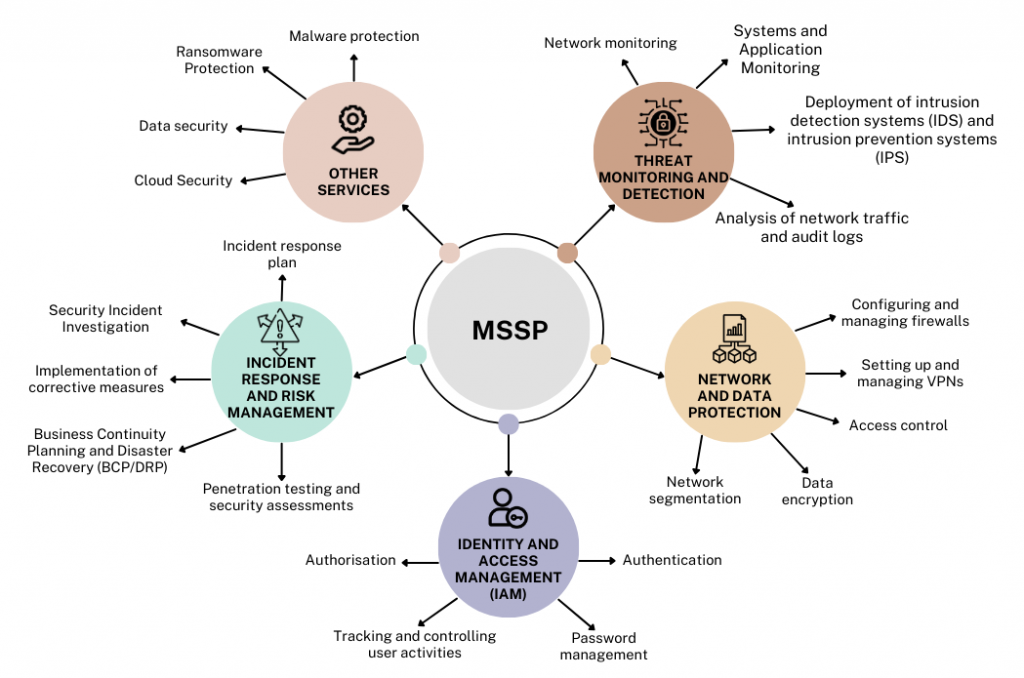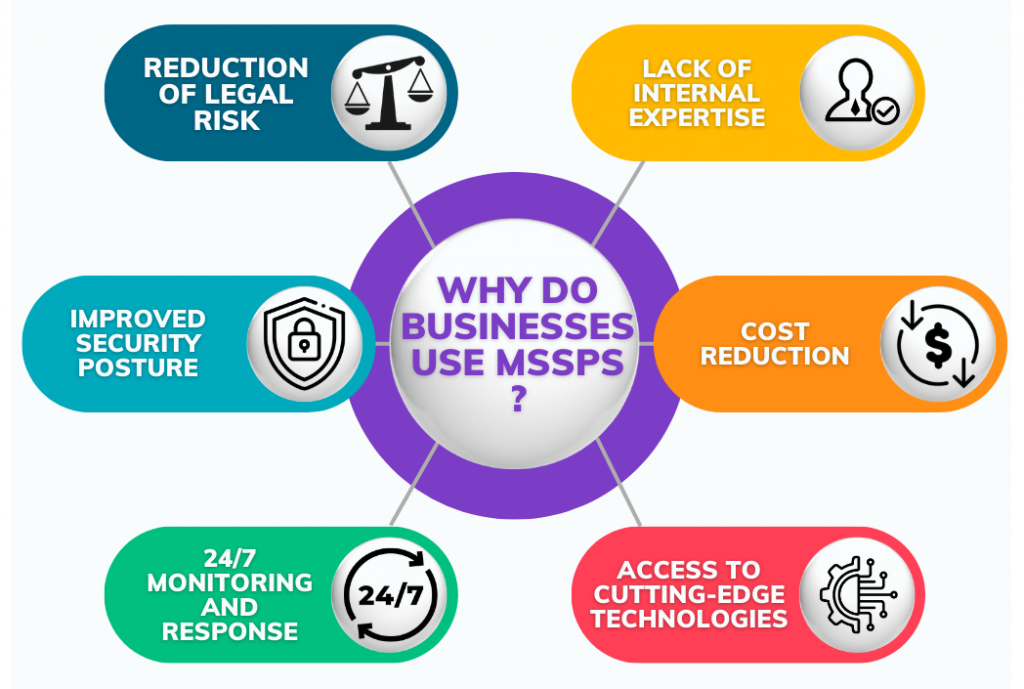What is an MSSP – Managed Security Service Provider?
A Managed Security Service Provider (MSSP), is an external company that offers other companies a wide range of cybersecurity services, ranging from network monitoring to incident management to responding to threats.
A Managed Security Service Provider (MSSP), is an external company that offers other companies a wide range of cybersecurity services, ranging from network monitoring to incident management to responding to threats.
What services do MSSPs offer?

The services of an MSSP can be grouped into 4 main categories:
- Monitoring and Threat Detection.
- Network and Data Protection.
- Identity and Access Management (IAM).
- Incident Response and Risk Management.
1. Threat monitoring and detection
Network monitoring
MSSPs use network monitoring tools to collect and analyze data from various points on the network, such as firewalls, routers, and servers.
This data helps identify suspicious activities, such as intrusion attempts, vulnerability scans and malicious data transfers.
Systems and Application Monitoring
MSSPs also monitor systems and applications for malicious behavior, such as unknown file execution, unauthorized data access, and privilege escalation attempts.
Deployment of intrusion detection systems (IDS) and intrusion prevention systems (IPS)
IDS identify suspicious activity on the network or systems, while IPS automatically blocks malicious activity.
Analysis of network traffic and audit logs
MSSPs analyze audit logs to identify unusual or suspicious activity, such as failed login attempts, configuration changes, and access to sensitive data.
2. Network and data protection
Configuring and managing firewalls
Firewalls control traffic entering and exiting the network, blocking unauthorized access and malicious communications. MSSPs configure and manage firewalls to ensure they provide adequate protection against known threats.
Setting up and managing VPNs
VPNs allow users to connect to the company network securely over the Internet. MSSPs configure and manage VPNs to ensure they use strong encryption protocols and robust authentication mechanisms.
Access control
MSSPs implement access controls to restrict access to systems and data based on the needs of each user. This helps limit the impact of an intrusion in the event of a user account being compromised.
Data encryption
MSSPs encrypt sensitive data, such as personal and financial data, to protect it against unauthorized access and data theft.
Network segmentation
Network segmentation divides the network into several zones, thus limiting the spread of malware and intrusions.
3. Identity and Access Management (IAM)
Authentication
MSSPs implement strong authentication processes to verify user identities before granting them access to systems and data. This may include the use of passwords, smart cards, biometrics or other authentication factors.
Authorisation
MSSPs define permissions for each user, specifying which systems and data they can access. This helps ensure that users only have access to the information and resources they need to do their jobs.
Password management
MSSPs implement strict password policies to force users to use strong and complex passwords. They may also offer password management tools to help users create and manage their passwords securely.
Tracking and controlling user activities
MSSPs monitor user activities to detect suspicious behavior, such as unauthorized data access, unauthorized configuration changes, and fraud attempts.
4. Incident response and risk management
Incident response plan
MSSPs implement an incident response plan defining the steps to follow in the event of a computer attack. This plan includes notifying stakeholders, investigating the incident, eradicating the threat, restoring systems, and preventing future incidents.
Security Incident Investigation
MSSPs investigate security incidents to identify the cause of the attack, the extent of the damage, and the corrective actions to take.
Implementation of corrective measures
MSSPs implement remedial measures to fix security vulnerabilities that were exploited in the attack and to prevent such incidents from happening again. This may include updating software, fixing vulnerabilities, raising user awareness, and improving security controls.
Penetration testing and security assessments
MSSPs perform penetration testing and security assessments to identify security vulnerabilities in company systems and networks. This allows proactive steps to be taken to patch vulnerabilities before they are exploited by cybercriminals.
Business Continuity Planning and Disaster Recovery (BCP/DRP)
MSSPs help businesses implement a BCP/DRP plan to ensure business continuity in the event of a major incident. This includes data backup, system recovery and restoration of critical activities.
Other services
In addition to these basic services, MSSPs may also offer specialized services, such as:
Malware protection
MSSPs provide malware protection solutions to detect, block and remove malware from systems and networks.
Ransomware Protection
MSSPs provide ransomware protection solutions to protect businesses against ransomware attacks.
Cloud Security
MSSPs help businesses secure their cloud environments by assessing risks, implementing security controls, and monitoring cloud activities.
Data security
MSSPs help businesses protect sensitive data by implementing data security controls, educating employees about data protection, and responding to data loss incidents.
Why do businesses use MSSPs ?

Many businesses choose to outsource their cybersecurity to an MSSP for several reasons:
- Lack of internal expertise.
- Cost reduction.
- Access to cutting-edge technologies.
- 24/7 monitoring and response.
- Improved security posture.
- Reduction of legal risk.
1. Lack of internal expertise
Finding and retaining qualified cybersecurity professionals can be difficult. MSSPs have teams of experts experienced in combating cyber threats.
Cybersecurity is an ever-changing field, and it’s difficult for businesses to stay up to date with the latest threats and best practices. MSSPs have access to the latest cybersecurity information and technology.
2. Cost reduction
Setting up and managing an in-house security team can be expensive. This includes salaries, benefits, training and safety tools.
Outsourcing to an MSSP can be more economical in the long run because businesses only pay for the services they need.
MSSPs can also help businesses reduce costs by identifying and fixing security vulnerabilities before they are exploited by cybercriminals.
3. Access to cutting-edge technologies
MSSPs continually invest in the latest cybersecurity technologies, which small businesses often don’t have access to.
This allows businesses to benefit from the latest protections against cyber threats.
MSSPs can also offer specialized services, such as ransomware protection and cloud security, that companies couldn’t implement in-house.
4. 24/7 monitoring and response
MSSPs provide 24/7 threat monitoring and response, which is crucial for businesses that operate around the clock.
This allows businesses to quickly detect and respond to security incidents, minimizing damage and business interruption.
MSSPs can also offer incident management services, which help businesses investigate incidents, eradicate threats, and restore their systems.
5. Improved security posture
MSSPs can help businesses improve their overall security posture by identifying security vulnerabilities and implementing adequate security controls.
This may include updating software, fixing vulnerabilities, raising user awareness and improving access controls.
MSSPs can also perform penetration testing and security assessments to identify security vulnerabilities before they are exploited by cybercriminals.
6. Reduction of legal risk
By outsourcing their cybersecurity to an MSSP, businesses can reduce their legal risk in the event of a security incident.
MSSPs have the expertise and resources to manage security incidents in a regulatory compliant manner.
This can help businesses avoid fines, litigation and reputational damage.
How choose an MSSP?
Choosing the right Managed Security Service Provider (MSSP) is a crucial decision for the security of your business. An MSSP can help you protect your systems, data, and networks from cyber threats, but it’s important to choose the right partner to meet your specific needs.
Here are some key points to consider when choosing an MSSP:
1. Identify your cybersecurity needs
Before you begin your MSSP search, it’s important to understand your cybersecurity needs. This involves identifying your most valuable assets, the types of data you collect and store, and the threats you are most likely to face.
2. Evaluate MSSP offerings
Once you have a good understanding of your needs, you can begin researching potential MSSPs. Compare their offerings in terms of services offered, industry expertise, reputation, pricing and service model.
3. Check the expertise and experience of the MSSP
Make sure the MSSP you’re considering has the expertise and experience to meet your specific needs. Ask about their certifications, training, and successful experiences with similar clients.
4. Evaluate MSSP technology and tools
The MSSP must use cutting-edge security technologies and tools to protect your systems and data. Find out about the specific technologies they use and make sure they are suitable for your needs.
5. Review the MSSP incident response process
The MSSP must have a clear and defined incident response plan in place. Find out about their incident detection, investigation and response process, and make sure it meets your expectations.
6. Check references and testimonials
Ask the MSSP for references and testimonials from previous clients. This will give you insight into their experience and satisfaction level.
7. Negotiate the contract and SLAs
Make sure you read and understand the contract and service level agreements (SLAs) before committing to an MSSP. The contract should clearly define the services provided, the expected performance levels and the responsibilities of each party.
8. Establish a relationship of trust
Choosing an MSSP is an important decision, and it’s essential to choose a partner with whom you can build trust.
